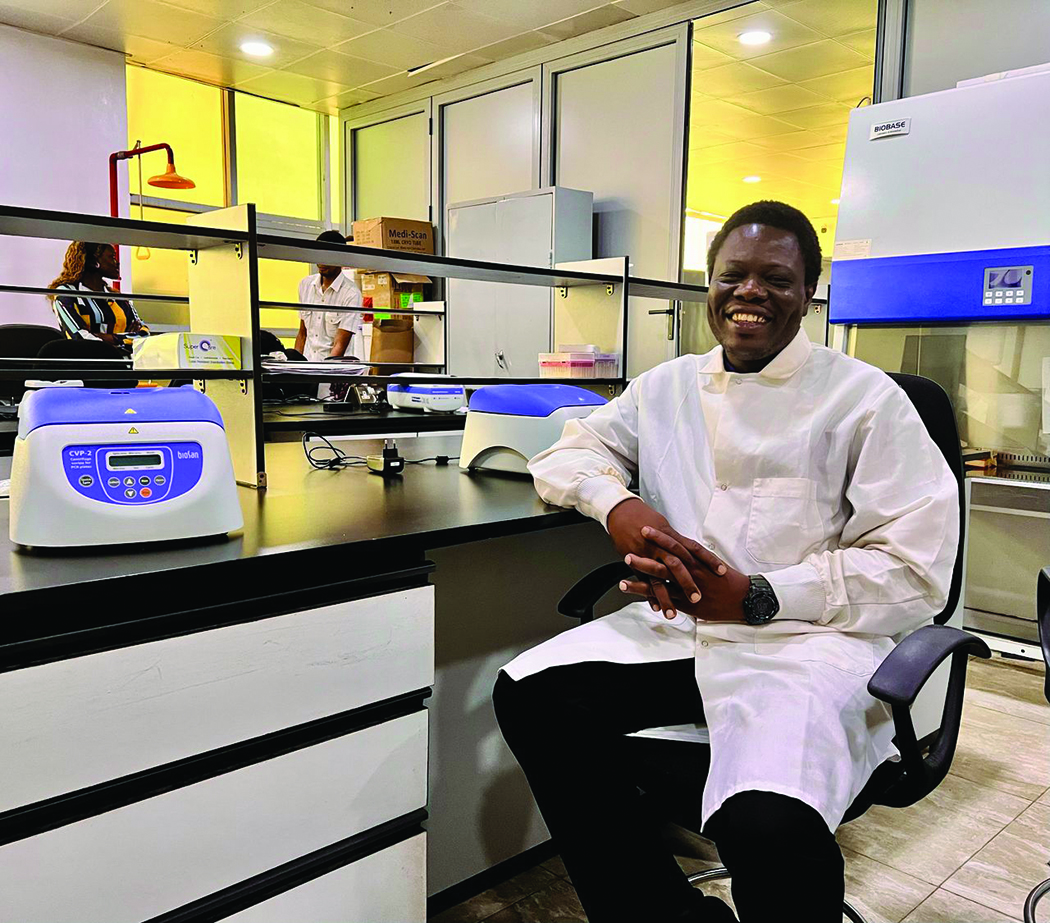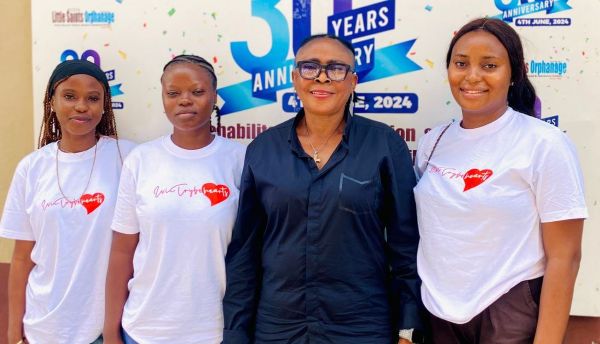Solomon Rotimi, a professor of Clinical Biochemistry at the Covenant University, Ota, Ogun State, is the Head of the Biochemistry and Applied Research Coordinator at the Covenant Applied Informatics and Communications African Center of Excellence. He discusses his recent publication on his Cancer Research study, saying that African Genomics data in cancer research has been sidelined for too long in the story of the precision medicine by the Western countries. Bennett Oghifo brings the excerpts:
What informed your choice of cancer for research?
After my PhD (Biochemistry) degree, with a focus on infectious disease, I attended a seminar organized by the Founder of the Prostate Cancer Transatlantic Consortium (CaPTC), Prof Folakemi Odedina (Mayo Clinic, USA). At the seminar, she mentioned that being a Black man is an established risk factor for prostate cancer. I challenged the idea because it was counter-intuitive to my training as a Biochemist. I questioned: if there is no difference between the cell of a white man and a Black man and there are no racial disparities in metabolism, how can there be a racial difference in cancer risk, to the extent that being black is a risk factor? Prof Odedina then encouraged me to pursue that area of research by using my expertise in Biochemistry and Molecular Biology to investigate why Black men have a disproportionately high risk of developing prostate cancer. That was how I got into cancer genomics research! Thereafter, I realized that Black women are also at higher risk of developing and dying from triple-negative breast cancer. Hence, my research portfolio is interested in understanding the genomics and environmental factors that predispose blacks to the disproportionate burden of some cancer and how we can use that knowledge to prevent and effectively treat this emperor of all maladies-as cancer was called by the author Siddhartha Mukherjee.
The title of your research is “Screening of Germline BRCA1 and BRCA2 Variants in Nigerian Breast Cancer Patients…” What is BRCA 1 and 2?
BRCA is simply an acronym for Breast Cancer, and these genes were named after the disease. So, BRCA1 is Breast Cancer gene 1, and BRCA2 is Breast Cancer gene 2. BRCA1 was the first gene that was discovered as a genetic risk factor in families with hereditary breast and ovarian cancer. The two of them are part of the system of genes that play a crucial role in maintaining the integrity of our DNA. They repair specific damages that may occur to our DNA. These damages could arise through the natural course of aging or be induced by environmental factors or lifestyle factors like stress. So, see these genes as police officers who move around the community to correct wayward folks before they become criminals and cause havoc. They do preventive policing of our genome, which is our entire genetic makeup. Unfortunately, things happen that can cause these police officers to go blind. Once blind, we can only hope that no wayward folk arise in the community. Should any arise, our police are blind and unable to prevent the eventual chaos. This is what happens when this genes are mutated. They lose their ability to correct cancer-causing DNA damage. When DNA is damaged in any tissue, and that damage is not repaired, the cell could become cancerous. This is why it is crucial to ensure the integrity of the police of the genome.
Cancer of the breast is on the rise in Nigeria, why is this so, and why is the particular variant of BRCA1 and BRCA2 prevalent in Nigeria?
The rising burden of breast cancer can be linked to an increase in risk factors, which are lifestyle and environmental changes. It is important to note that our genes are not different from those of our parents, but our lifestyle and environment have changed a lot. We now get exposed to an unusual stress level beyond what our ancestors could have imagined. The amount of chemicals we are exposed to in this generation is unimaginable. For example, breast cancer is influenced by hormones, but we now get our babies exposed to chemicals that disrupt these hormones, chemicals like BPA that are in plastics. Recall that our grandparents did not use plastics. Another factor that is emerging is the deficiency of Vitamin D. Although we have sun in abundance, we have modified our lifestyle so much that we don’t get adequate sun exposure again. Because an essential function of vitamin D is the regulation of inflammation, its lack, has been linked to increased inflammation, and inflammation is a major driver of cancers like that of the breast. Every population or group of people has specific variations in their genome, and these variations are a product of ancient adaption. As the human race migrated from one place to another, some changes happened to the genes that allow us to survive things like diet, weather, and particularly infectious diseases. So, the specific variations in every population are determined by the environment, cross-breading, or even accidents of life that their ancestors experienced in the past. This could explain why Nigeria has particular variants of BRCA1 and BRCA 2 that are more prevalent here.
The International Agency for Research on Cancer (IARC) revealed that about 45 women died of breast cancer per day in 2022, why has the disease become intractable?
The burden of breast cancer in Africa, specifically in Nigeria, is on the rise, with the 2022 mortality figure of 16,332 Nigerian women dying from breast cancer. This, of course, translates to about 45 women dying of breast cancer in Nigeria daily. However, we have also seen that this trend is reducing in Europe and America. So the question is, what are they doing differently? Well, the primary reason for this is advancements in the science of understanding how our genes increase our risk of developing a disease and how such genetic information can also be used to treat the disease. This is called precision medicine. A complex disease like cancer cannot be treated with a “one-size-fits-all” approach. However, over 95% of the research that drives precision medicine science is done on the white population, and that is why they benefit more from it. The knowledge is easily translatable for cancer control in their population. However, in Nigeria and most African countries, the Achilles heel has been the capacity to do this type of research locally. Hence, we do not know our specific genetic risk factors and how to integrate such knowledge into our cancer control plans. Also, because this resource and capacity were not available locally, our ability to integrate precision medicine into our local control cancer agenda has been hampered.
The spread of cancer is assuming a dangerous dimension. In some quarters, it is assumed cancer is principally a disease for the affluent, but it is manifesting in different classes of people. What are the triggers of the disease, and what age bracket is prone to the attack?
Generally, cancer is a disease of age, although there are cancers that often occur in children. The triggers of cancer could be environmental factors or infectious agents. For example, cancers like that of the cervix and liver cancer can be triggered by viruses, while that of the lungs can be triggered by cigarette smoke. However, not all cancers have specific well established triggers, but rather, some conditions are referred to as risk factors, some are modifiable while others are not. In the case of breast cancer, examples of modifiable risk factors is the use of some birth control or abortion pills, while a non-modifiable risk is being a woman. Hence, based on the increase in exposure to modifiable risk factors, women as young as 20 years of age are now having breast cancer.
In the Germline BRCA1 and BRCA2 Variants, what did Covenant University researchers do differently?
There are a few cancer genomics studies that have been conducted on Nigerians and have identified some BRCA1 and BRCA2 variants for breast, ovarian, and prostate cancer. However, those studies were not performed locally. The samples were collected in Nigeria, but laboratory work, computational analysis, and interpretation were done outside Nigeria. This is akin to us exporting crude oil for refining. So, what we did at Covenant University was to localise every part of the process. We conducted the analysis entirely in Nigeria. It has been a long process of intentionally developing capacity and building infrastructure to meet this critical area of need, and we are grateful for achieving this feat. So, you will notice from the authorship pattern of our publication that there is no foreign-affiliated author. At Covenant University, we have the capacity and skill to do the genomics analysis, and the computational tools and knowledge to analyse the data.
Talking about genes, what chances do children have against this affliction?
The genes themselves are not the affliction. However, because everything reproduces after its kind, BRCA1 and BRCA2 mutations are inherited, which means they can be passed down from parent to child — whether male or female. Each child of a parent who carries a BRCA mutation has a 50 percent chance of inheriting that mutation. So, this is not just about their children but family members in general. An easily relatable similitude is the sickle cell condition. It is noteworthy that inheriting a BRCA mutation doesn’t mean an individual will definitely develop cancer. A woman who inherits a harmful BRCA1 mutation may have up to a 72 percent lifetime risk of developing breast cancer. This means that there are those who have this mutation but do not develop the disease. Research has shown that there are specific lifestyle factors, like the consumption of a Mediterranean diet, that reduce the risk of individuals with BRCA mutations from developing breast cancer. However, this study was done in Europe, and our duty as researchers is to identify the lifestyle that reduces the risk of people with BRCA mutation in this population from developing the disease. Another good news is that knowledge is power. If someone knows early that they carry a BRCA mutation, they can take proactive steps such as regular screening or even preventive treatments. So, based on this type of knowledge, in other countries, many women with BRCA mutations survive and thrive because they know the risk early and are empowered with scientific knowledge of precision behavioural and medical interventions.
This is why genetic testing and counseling are so critical — not just for those affected by the disease but for their whole family. Our study is trying to make that kind of awareness and testing available and affordable in Nigeria because there are clear limitations to access. The report reveals that some Nigerian women may carry unique genetic markers for breast cancer that are not seen in the Western population. Kindly throw more light on this. As I stated earlier, genetic variations are population specific. Hence, it is not surprising that we found a kind of variation pattern (called haplotypes) unique to this population. This simply represents the unique way these genes are passed down from generation to generation in this population. The good thing about identifying this pattern is that it helps us develop population-relevant low-cost testing for multiple variation at times.
You advocated for population-specific genetic testing, what is this about?
As I stated previously, every population or group of people has their common genetic uniqueness. Hence, population-specific genetic testing means developing and using genetic screening tools tailored to the unique genetic makeup of different groups of people. We need to do this for our populations in Nigeria because most of the genetic tests available today were developed using data from European or North American populations. If a Nigerian patient requests a genetic test today, the test will most likely be done abroad, and the result may be measured against European or North American references. There is a serious issue with this because the White populations are not genetically the same as us. There is emerging evidence that this could lead to genetic misdiagnosis. In a nutshell, it is imperative that we build genetic databases and screening tools using our own data so we can detect cancer risk accurately in a manner that is relevant to us. It’s about equity. It’s about saving lives by making precision medicine truly inclusive and relevant to us.

















Leave a comment